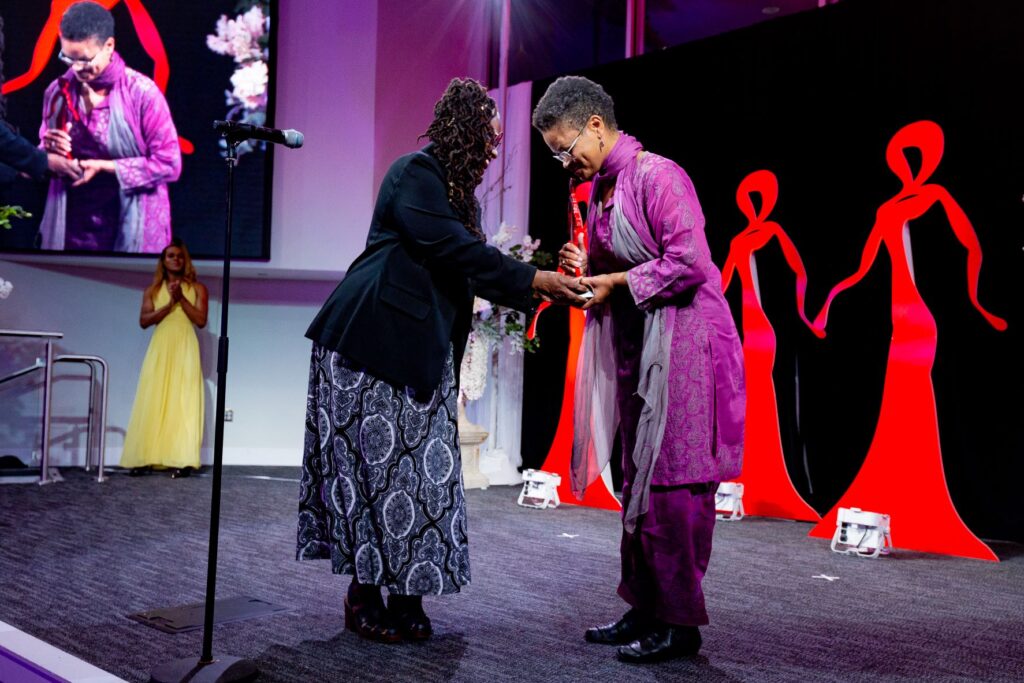
by Melissa Marcus
Tonia Poteat, CHER Core Faculty and head of the RISE lab, was recently awarded the Pandora Singleton Ally Award. The Center for Health Equity Research (CHER) asked for Poteat’s reflections on the award and learned more about what motivates her research.
Presented by SisterLove, the award honors Pandora Singleton and recognizes “another ally who is a leading woman” and who “has been an invaluable ally for more than 20 years to Women Leaders Living with HIV.”
What does the Pandora Singleton Ally Award mean to you?
This award is named after an amazing woman who was not living with HIV and was very passionate in her advocacy for women who were.
This award means that I have followed in her amazing footsteps in my commitment to the well-being of women with HIV.
We’d love to hear how you know that the work you’re doing is the right fit for you?
I got involved in HIV-related advocacy in college in the late 1980s when stigma and discrimination against people with HIV was even worse than it is now; and women were virtually invisible.
Through this advocacy work, I learned about the relationships between HIV and social justice and how deadly inequity can be. I went to Physicians Assistant (PA) school so that I could provide healthcare for people living with HIV and have continued to do so throughout my subsequent career in public health and research.
I know that it’s right for me because I never grow tired of this work. I find it incredibly gratifying to both provide care for people living with HIV as well as to conduct research designed to promote health equity.
Tell us about the RISE lab. What kind of projects does your team work on?
Our team works on a wide variety of projects focused on health equity for sexual and gender minorities and people living with HIV.
We are very excited about two new studies that will be launching soon.
One is called CARES (Creating Access to Resources and Economic Support) [and] is a partnership with the Black Transgender Advocacy Coalition designed to evaluate if providing unconditional cash grants to transgender adults experiencing material hardship will improve their mental health over time.
The other project is a partnership with Wits Reproductive Health Institute in South Africa. It is an implementation science study designed to assess the impact of transgender-specific health services on HIV prevention and treatment outcomes.
What’s the most important thing for people to understand about what you (or the RISE lab) do/es?
We are very committed to community-engaged research and to applying an intersectional lens to all of our work.
We want our work to be actionable, accessible and make a real impact in the lives of real people. We always consider the intersection of racism, xenophobia, homophobia, sexism and transphobia when we design and implement our research studies.
What are some challenges you face?
Conducting research requires a lot of tedious administrative work that occurs mostly under the radar for folks outside of academia. So, we face challenges explaining to community partners why some processes take so long and are so complicated.
Because a lot of our work addresses health inequities faced by transgender people of color, we are always concerned about the safety of our participants and ourselves in an increasingly hostile political environment.
At this stage in your career, what wisdom would you share with others interested in the work you/your lab do/es?
Research can seem glamorous from the outside, but it requires a lot of hard work that is not the most exciting.
However, it’s important for students, especially those who are interested in health equity research to take advantage of research learning opportunities that allow that “inside look” into academia.
Most importantly, follow your passion. I never imagined as a college volunteer that I would still be working in HIV 30 years later, but I am so glad that I am!
